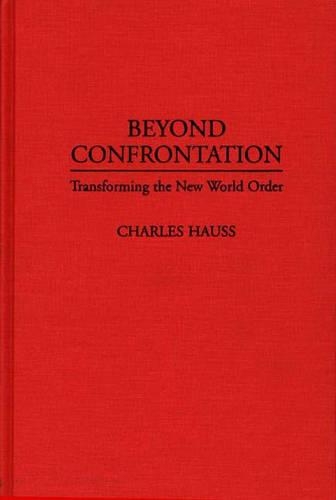
Beyond Confrontation: Transforming the New World Order
(Hardback)
Available Formats
Publishing Details
Beyond Confrontation: Transforming the New World Order
By (Author) Charles Hauss
Bloomsbury Publishing PLC
Praeger Publishers Inc
30th May 1996
United States
Classifications
Tertiary Education
Non Fiction
Ethics and moral philosophy
Political science and theory
327
Physical Properties
Hardback
264
Description
This work presents confrontation as the key theme of the post-Cold War world. It argues that the world could be changed dramatically for the better if people and governments were to adopt a new way of thinking and dealing with conflict that takes us beyond confrontation. The examples of war, international economics, environmental decay, and racial conflict show that in today's interdependent world, the problems we face are interdependent too. The central tenet is that it is almost always more pragmatic to act co-operatively. Most important, the book shows that co-operative problem-solving is not mere "pie in the sky" idealism.
Reviews
.,."The author concludes that the traditional win-lose approach to conflict resolution is counterproductive and in the face of global interdependence shortsighted and dangerous. Instead, we must focus on win-win outcomes in which all parties benefit. This is not only rational but smart policy. The book presents a good summary of existing literature on the issues of conflict and conflict resolution. Recommended for upper-division undergraduate and graduate courses."-Choice
...The author concludes that the traditional win-lose approach to conflict resolution is counterproductive and in the face of global interdependence shortsighted and dangerous. Instead, we must focus on win-win outcomes in which all parties benefit. This is not only rational but smart policy. The book presents a good summary of existing literature on the issues of conflict and conflict resolution. Recommended for upper-division undergraduate and graduate courses.-Choice
..."The author concludes that the traditional win-lose approach to conflict resolution is counterproductive and in the face of global interdependence shortsighted and dangerous. Instead, we must focus on win-win outcomes in which all parties benefit. This is not only rational but smart policy. The book presents a good summary of existing literature on the issues of conflict and conflict resolution. Recommended for upper-division undergraduate and graduate courses."-Choice
Author Bio
CHARLES HAUSS, the author of four other books, is a member of the Public and International Affairs Department at George Mason University and is also currently Visiting Research Fellow and Professor at the University of Reading (UK).
